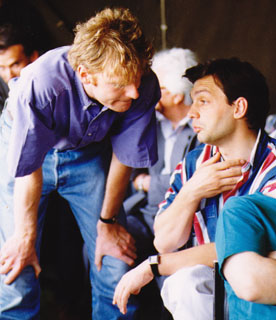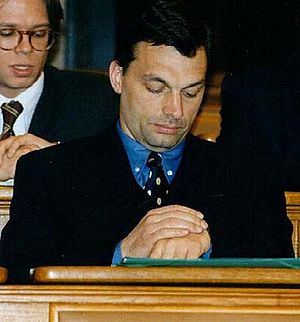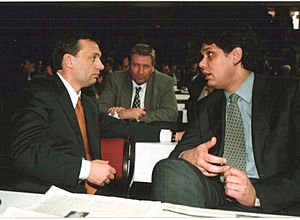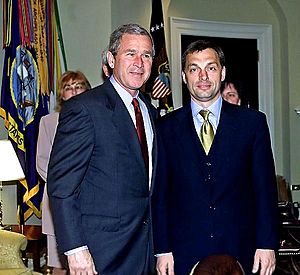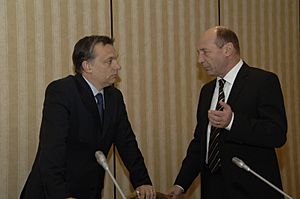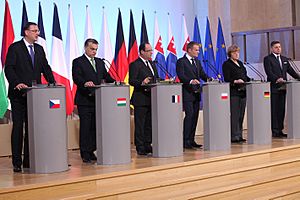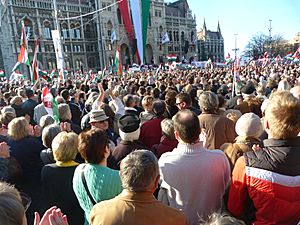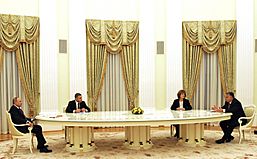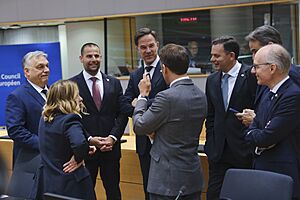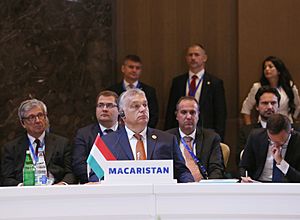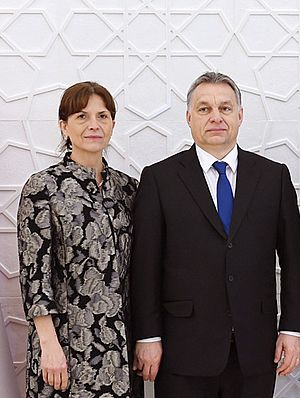Viktor Orbán facts for kids
Quick facts for kids
Viktor Orbán
MP
|
|
|---|---|
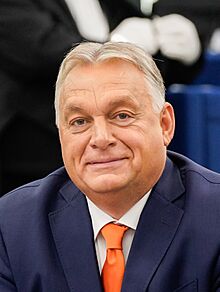
Orbán in 2024
|
|
| Prime Minister of Hungary | |
| Assumed office 29 May 2010 |
|
| President | |
| Deputy |
|
| Preceded by | Gordon Bajnai |
| In office 6 July 1998 – 27 May 2002 |
|
| President | |
| Preceded by | Gyula Horn |
| Succeeded by | Péter Medgyessy |
| President of Fidesz | |
| Assumed office 17 May 2003 |
|
| Preceded by | János Áder |
| In office 18 April 1993 – 29 January 2000 |
|
| Preceded by | Office established |
| Succeeded by | László Kövér |
| Member of the National Assembly | |
| Assumed office 2 May 1990 |
|
| Personal details | |
| Born |
Viktor Mihály Orbán
31 May 1963 Székesfehérvár, Hungary |
| Political party | Fidesz (since 1988) |
| Spouse |
Anikó Lévai
(m. 1986) |
| Children | 5, including Gáspár |
| Parents |
|
| Residences | Carmelite Monastery of Buda 5. Cinege út, Budapest |
| Education |
|
| Profession |
|
| Signature | |
Viktor Mihály Orbán (born 31 May 1963) is a Hungarian politician. He has served as the Prime Minister of Hungary since 2010. Before that, he was also Prime Minister from 1998 to 2002. He has been the leader of the Fidesz political party since 1993, except for a short break between 2000 and 2003.
During his time as Prime Minister, Hungary's government has changed its direction. Orbán has described this as an "illiberal democracy." This means it focuses less on traditional liberal ideas and more on national interests. He has also worked to build closer ties with countries like China and Russia.
Contents
Growing Up in Hungary
Orbán was born on 31 May 1963 in Székesfehérvár. He grew up in a middle-class family in the countryside. His father, Győző Orbán, was a farmer and businessman. His mother, Erzsébet Sípos, was a special education teacher. Viktor is the oldest of three brothers.
He spent his childhood in the villages of Alcsútdoboz and Felcsút. He went to school there and in Vértesacsa. In 1977, his family moved to Székesfehérvár permanently. When he was 14 and 15, he was a secretary for a communist youth group. Joining this group was required to go to university at that time.
Orbán finished high school in Székesfehérvár in 1981, where he studied English. After school, he served two years in the military. He later said that his political views changed a lot during his military service.
In 1983, Orbán began studying law at Eötvös Loránd University in Budapest. He wrote his main paper on the Polish Solidarity movement. After becoming a lawyer in 1987, he worked as a sociologist in Budapest for two years.
In 1989, Orbán received a scholarship to study political science at Oxford University. He left Oxford in January 1990 to return to Hungary. He wanted to run for a seat in Hungary's first parliament after the communist era.
Early Political Steps (1988–1998)
On 30 March 1988, Orbán helped start the Fidesz party. Its original name meant "Alliance of Young Democrats." He was the party's first spokesperson. Many of the first members were students who were against the communist government.
On 16 June 1989, Orbán gave an important speech in Heroes' Square in Budapest. This was during the reburial of Imre Nagy, a hero of the 1956 Hungarian Revolution. In his speech, Orbán called for free elections and for Soviet troops to leave Hungary. This speech made him widely known.
After returning from Oxford, he was elected as a Member of Parliament in 1990. He became the leader of the Fidesz group in parliament until May 1993.
On 18 April 1993, Orbán became the first president of Fidesz. Under his leadership, Fidesz changed from a student group to a more central-right political party. This change caused some members to leave the party.
In the 1994 election, Fidesz barely got enough votes to enter parliament. Orbán became a Member of Parliament again. He worked on European integration issues from 1994 to 1998. In 1995, Fidesz added "Hungarian Civic Party" to its name.
In November 2000, Fidesz joined the European People's Party (EPP). This is a large group of center-right parties in Europe. Orbán worked to unite similar parties in Hungary. He was elected vice-president of the EPP in 2002.
First Time as Prime Minister (1998–2002)
In 1998, Orbán formed a government with other parties. This group won the 1998 elections. Orbán became Prime Minister at 35, making him one of the youngest in Hungary's history. He was also the first leader in Eastern and Central Europe after the Cold War who had not been a member of a communist party.
His government quickly started to change how the government worked. They reorganized ministries and created a large ministry for the economy. They also changed social security payments. Orbán made the Prime Minister's office stronger.
The government tried to make some changes to how parliament worked. They wanted to hold meetings less often and change voting rules. However, the Constitutional Court said some of these changes were not allowed.
There were some changes in government officials. Two of Orbán's secretaries resigned due to issues related to a military contract. The head of the Tax Office also resigned. The government also had disagreements with the Budapest City Council about canceling two big city projects.
Relations between Orbán's government and the opposition parties became difficult. The government tried to replace leaders of important institutions with people from their own party. Orbán sometimes did not attend parliament question times for long periods.
In 2001, there were several political issues. A problem with one of the coalition parties led to its leader being removed. This party then broke apart, and many of its members joined Orbán's party.
Economy Focus
Orbán's economic plan aimed to lower taxes and social security payments. It also focused on reducing inflation and unemployment. The government brought back universal maternity benefits and removed university tuition fees. They continued to work on balancing the budget.
The economy saw good results. Inflation dropped from 15% in 1998 to 7.8% in 2001. The economy grew steadily each year. The national debt also decreased. There was hope that Hungary could join the Eurozone by 2009. Orbán sometimes criticized the European Union for delays in Hungary joining.
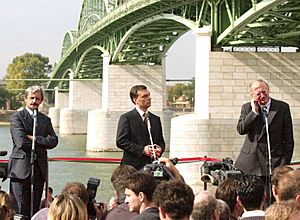
Foreign Relations
In March 1999, Hungary joined NATO, along with the Czech Republic and Poland. This meant Hungary had to be involved in the Kosovo crisis and modernize its army. NATO membership also affected the economy due to trade restrictions on Yugoslavia.
Hungary also gained international attention for a "status law" it passed in 1999. This law aimed to help about three million ethnic Hungarians living in neighboring countries. It offered them education, health benefits, and job rights. Neighboring countries like Romania saw this as interfering in their affairs. However, the law was later changed after agreements with Romania and Slovakia.
Leader of the Opposition (2002–2010)
In the 2002 parliamentary elections, Orbán's party lost to the Hungarian Socialist Party. This was a very intense election. Orbán's group became the main opposition. The turnout for the election was very high.
After the election, some groups questioned the results and claimed fraud. However, election observers from the Organization for Security and Co-operation in Europe said the election was fair. They only noted that state television seemed to favor Fidesz.
During this period, Orbán received several awards. These included the Freedom Award from the American Enterprise Institute (2001) and the Grand Cross of the National Order of Merit (2001). In 2004, he received the Papal Grand Cross of the Order of St. Gregory the Great.
In the 2004 European Parliament election, Fidesz won by a large margin. They got 47.4% of the votes and 12 out of Hungary's 24 seats in the European Parliament.
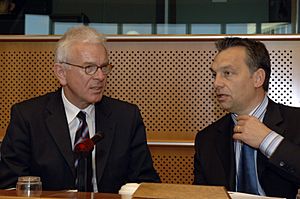
Orbán ran for Prime Minister again in 2006 but did not win a majority. However, his position as Fidesz leader became strong again after conflicts with the ruling government. He was re-elected as Fidesz president in May 2007.
On 1 October 2006, Fidesz won the local municipal elections. They won in 15 of Hungary's 23 largest cities. This helped balance the power of the Socialist-led government.
On 9 March 2008, a national vote took place. This vote was about removing government changes that introduced doctor fees and university tuition fees. Fidesz started this vote against the ruling party. The vote passed, which was a big win for Fidesz.
In the 2009 European Parliament election, Fidesz won by a huge margin. They received 56.36% of the votes and 14 out of Hungary's 22 seats.
Second Time as Prime Minister (2010–Present)
In the 2010 parliamentary elections, Orbán's party won a large majority of seats. This gave him enough power to change the Constitution. His government wrote and passed a new constitution in 2011. This new constitution supported traditional values and Christianity. It also changed the number of seats in the Hungarian Parliament. The new constitution became active on 1 January 2012.
In his second term, Orbán faced some criticism. He made statements against traditional liberal democracy. He also proposed an "internet tax," which led to protests in Budapest in November 2014.
His government introduced a flat tax on personal income, set at 16%. Orbán called his government "pragmatic." They made changes like restricting early retirement for police and military. They also made welfare payments more transparent.
After the 2014 parliamentary election, Fidesz won a majority again. They got 133 out of 199 seats. While still a large majority, their share of the national vote was slightly lower than in 2010.
During the 2015 European migrant crisis, Orbán ordered the building of a barrier on the border with Serbia. This was to stop people from entering Hungary illegally. Hungary aimed to register all migrants coming from Serbia, as required by EU law. Under Orbán, Hungary took many steps to control immigration. In May 2020, the European Court of Justice ruled against Hungary's migrant transit zones. Orbán then ended these zones and made asylum rules stricter.
In the 2018 Hungarian parliamentary election, the Fidesz alliance won again. They kept their large majority, and Orbán remained Prime Minister. Orbán and Fidesz focused their campaign on immigration. The election result was seen as a win for right-wing populism in Europe.
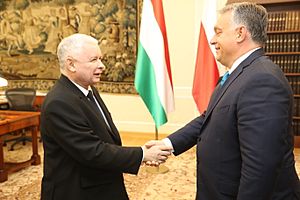
On 30 March 2020, the Hungarian parliament voted to create a state of emergency without a time limit. This allowed the Prime Minister to make rules by decree. It also suspended special elections and introduced possible prison sentences for spreading false information. Two and a half months later, on 16 June 2020, the parliament ended the state of emergency. However, on the same day, a new law was passed. This law allowed the government to declare future "medical" states of emergency without parliament's approval.
In 2021, the parliament moved control of 11 state universities to foundations. These foundations were led by people close to Orbán. A residential college, the Mathias Corvinus Collegium, received a large amount of government money. This was reportedly to train future conservative thinkers.
Europe faced big increases in energy prices in 2021. This was due to high demand for natural gas and less supply from Russia and Norway. Orbán blamed these price increases on the European Commission's Green Deal plans.
In the 2022 parliamentary election, Fidesz won a majority again. They got 135 out of 199 seats. Orbán declared victory, saying, "We won a victory so big that you can see it from the moon, and you can certainly see it from Brussels." The opposition leader admitted defeat.
Foreign Policy Overview

In July 2018, Orbán visited Turkey for the inauguration of President Recep Tayyip Erdoğan. In October 2018, Orbán said that a stable Turkish government is important for Hungary's safety from overland migration.
In June 2019, Orbán met with Myanmar's State Counsellor, Aung San Suu Kyi. They talked about relations between their countries and illegal migration.
Hungary and China
Orbán has kept close ties with China during his time as Prime Minister. His government is often seen as China's closest ally in the European Union. Hungary joined China's Belt and Road Initiative (BRI) in 2015. In April 2019, Orbán attended a BRI meeting in Beijing and met with Chinese leader Xi Jinping. He also supported plans to open a Fudan University campus in Budapest, which caused some debate in Hungary.
Hungary and Turkic States
Since 2014, Hungary has been an observer at the General Assembly of Turkic-speaking States. In 2018, Hungary gained observer status in the Turkic Council. In 2021, Orbán said that Hungarian and Turkic peoples share a long history and culture. He mentioned that Hungarians are proud of this heritage. In 2023, during a visit to Kazakhstan, Orbán said Hungarians feel a connection to Kazakhstan because of their "millennial common roots."
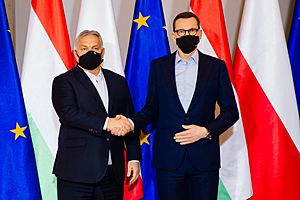
Personal Life
Orbán married Anikó Lévai, a lawyer, in 1986. They have five children. Their oldest daughter, Ráhel, is married to István Tiborcz. Orbán's son, Gáspár, used to play football. He is also one of the founders of a religious group called Felház. Orbán has three younger daughters (Sára, Róza, Flóra) and three granddaughters.
Orbán is a member of the Reformed Church in Hungary, which is Calvinist. His wife and children were raised Catholic. His son Gáspár Orbán joined the Faith Church, a Pentecostal group, in 2014. He is now a minister.
Love for Football
Orbán loves sports, especially football. He used to play for a team called FC Felcsút. He even appears in the video game Football Manager 2006.
After his playing career, he became a major supporter of Hungarian football. He helped fund his hometown club, Felcsút FC, which later became the Ferenc Puskás Football Academy. He played a key role in building modern training facilities for young Hungarian footballers.
He also helped start the annual international youth tournament, the Puskás Cup. This tournament is held at the Pancho Aréna in his hometown. His son Gáspár trained there.
It is said that Orbán watches many football games each day. His first trip abroad as Prime Minister in 1998 was to the World Cup final in Paris. He has reportedly not missed a World Cup or Champions League final since.
In 2009, the then-president of FIFA, Sepp Blatter, visited the Puskás Academy. Blatter, along with Ferenc Puskás's widow and Orbán, announced the creation of the new FIFA Puskás Award during that visit. Orbán also had a small role as a footballer in a Hungarian family film called Szegény Dzsoni és Árnika (1983).
Awards and Honors
Foreign Awards
 Bosnia and Herzegovina (
Bosnia and Herzegovina ( Republika Srpska):
Republika Srpska):
 France:
France:
 Grand Cross of the National Order of Merit (2001)
Grand Cross of the National Order of Merit (2001)
 Kazakhstan:
Kazakhstan:
 Lithuania:
Lithuania:
 North Macedonia:
North Macedonia:
 Serbia:
Serbia:
 Vatican:
Vatican:
Religious Awards
- Holy Cross Medal of Gratitude (Armenian Catholic Church, 2022)
- First Class of the Order of Glory and Honor (Russian Orthodox Church, 2023)
- First Class of the Order of St. Sava (Serbian Orthodox Church, 2022)
Other Honors
- Honorary senator of the European Academy of Sciences and Arts (2000)
- Freedom Award by the American Enterprise Institute (2001)
- Franz Josef Strauss Prize from the Hanns Seidel Foundation (2001)
- Polak Award established by the Maria Polak Foundation (2001)
- Prize for the Social Market Economy by the German Club of Economics (2002)
- Honorary Citizen of Szék, Hungary (2002)
- Saint Stephen Award (2002)
- László Tőkés Award by the László Tőkés Foundation (2003)
- Honorary Citizen of Esztergom, Hungary, twice (2006, 2009)
- Gold Medal of the Foundation of European Merit (2004)
- World No Tobacco Day Award by the World Health Organization (2013)
- Title 'Man of the Year 2013' by Polish magazine Gazeta Polska (2014)
- 'The 28 People From 28 Countries Who Are Shaping, Shaking And Stirring Europe: Class Of 2016' by magazine Politico Europe
- Title 'Man of the Year 2015'at the Economic Forum in Poland (2016)
- FINA Order of Merit (2017)
- Golden Order of the Azeri international magazine My Azerbaijan (2022)
- Supreme Order of Turkic World (6 November 2024)
Images for kids
See also
 In Spanish: Viktor Orbán para niños
In Spanish: Viktor Orbán para niños


